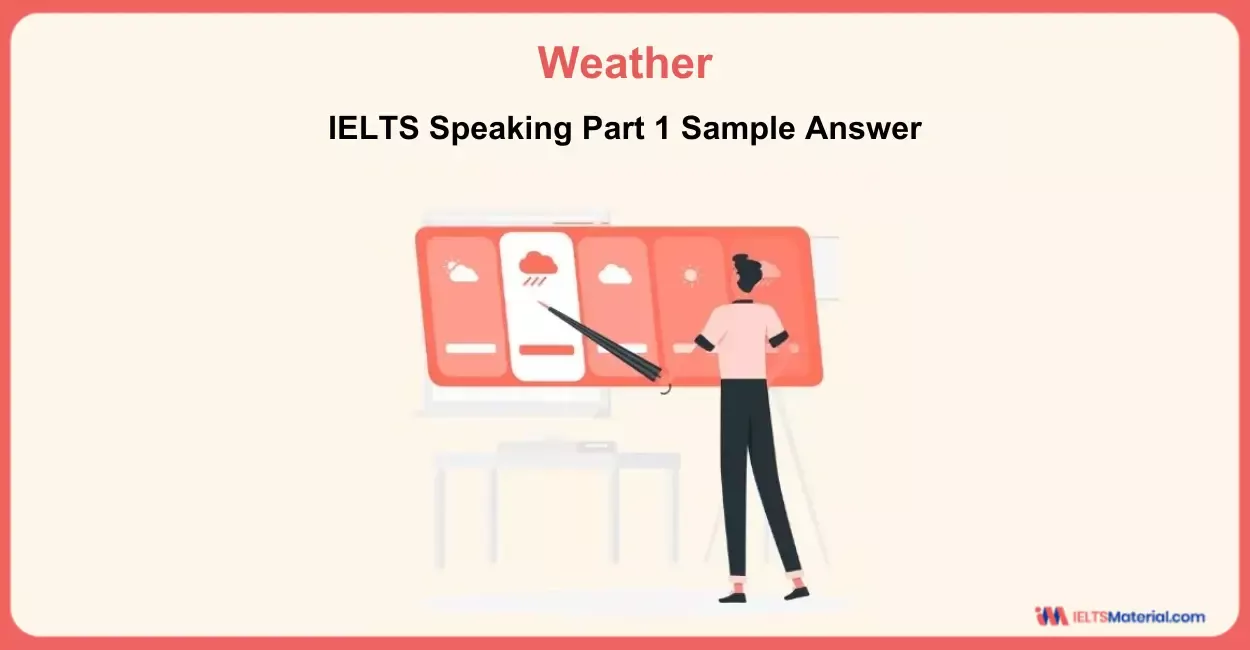Weather - IELTS Speaking Part 1 Sample Answer
Ready to talk about ‘Weather’ like a native? Check out creative ways to answer IELTS Speaking Part 1 questions on sunny days, chilly mornings or heavy rain. Also, learn high-scoring vocabulary to boost your fluency and aim for a Band 8+.
Table of Contents

Get a Complimentary IELTS Speaking Strategies PDF
The Speaking topic, ‘Weather’, explores questions which are commonly asked about weather and climate. Remember that the IELTS Speaking test begins with the examiner introducing and asking you to introduce yourself, helping you ease into the test with basic questions about your name, background, and other personal details.
Be it blazing sunshine, chilly gusts, or an unforeseen drenching right, weather is a very common topic. Therefore, we’ve put together sample responses with appropriate vocabulary to impress the examiner. With a few band 8+ tips, you will be able to stand out and achieve your desired band score with ease.
Connect with our IELTS Experts to crack your IELTS Speaking and ace the exam with a band 8+! Book a Free Demo.
How to Answer IELTS Speaking Part 1 Questions on ‘Weather’?
The questions provided in the IELTS Speaking Part 1 give you a chance to demonstrate your ability to elaborate your answers with an extensive range of vocabulary and grammar. Thus, it is always crucial to learn a few strategies so that you can learn how to formulate your answers effectively. Below is a list of some tricks to work with on topics like 'Weather.'
- While the questions might seem easy and direct, you should not just give a one-word answer. Always consider making a sentence or two that would support your answer to showcase your level of English proficiency.
- Avoid memorizing any answer since it would make you sound robotic. Instead, try to use different variations in your voice based on the emotions and keep working on your intonation and modulation.
- Using appropriate words will make your answer sound more fluent and natural. Use these terms regularly so that you can use them in the right places when dealing with different topics. Therefore, practice learning the latest IELTS Speaking vocabulary to boost your score.
- Always record yourself so that you can listen back to it later and critically analyze your answer. This practice will help spot the areas where you would need improvement in terms of any hesitation or fluency.
- Remember to paraphrase the question and give a more detailed answer. But, you should focus on staying on track when answering the questions rather than going off-topic with excessive explanation.
- Keep in mind to use the Useful Idioms for IELTS Speaking to Score Band 8.0+ which will help your answers sound more expressive. However, don't repeat the same idioms every time, as it can make your response sound redundant.
- Try not to self-correct yourself whenever you find an answer unless it is absolutely necessary. Use filler words instead so that your fluency won't be affected much.
- Dive into the main topics from IELTS Grammar and learn how to create various types of sentence structures, which can help you get a higher score in grammatical range and accuracy.
Want to learn how to score a band 9 in the IELTS Speaking Section? Check out the video below!
IELTS Speaking Part 1 Questions on Weather
Now that you’ve got a clear idea of how the IELTS Speaking Part 1 works, let’s get right into the main area of focus. When speaking, your tone will clarify and convey meaning so that you can achieve a higher IELTS Band Score. For the topic ‘Weather IELTS Speaking Part 1,’ you’ll be asked the following questions. Even though the answers are provided, it is suggested to first attempt answering these questions on your own and then proceed to check the sample answers.
- What’s the weather like in your country?/ What kind of weather is typical for your country?
In my country, the weather varies greatly because of the diverse geographical features. The northern regions experience scorching summers and freezing winters, while coastal areas enjoy a milder maritime climate throughout the year. However, recent years have shown unpredictable shifts in weather due to climate change.
- What’s your favorite type of weather?/What kind of weather do you like?
I adore sunny, serene weather with a mild breeze that tugs at the edge of a cloud or two. It is perfect for outdoor activities like picnics and nature walks. To me, these days carry a vibe of exhilaration that is not too capsizing for leisure or work.
- Do you prefer hot or cold weather?
I tend to prefer mild climates, which I consider more comfortable. I like the buzz of warm weather when it isn't oppressively hot that drains you out. A crisp weather can be energizing, but bitter cold is something I do not wish to have.
- How does the weather influence your daily life?
Weather plays a pretty considerable role in my lifestyle. On really hot days during summer, I tend to keep to indoor activities and make heavy use of the air conditioner. On the other hand, good weather conditions are an invitation to step outside for jogging or hiking.
- Do you think the weather affects your moods?
Yes, weather has a heavy influence on my emotions. On bright, sunny days, everything feels invigorating, while overcast skies with a blanket of cloud can be rather dismal. In fact, with changing seasons, long winter days also bring about seasonal affective disorders.
- In what weather do you typically wear?
The weather decides my dressing style. For intense heat, I prefer linen or any other light and breathable fabric. The cold winter days are for layers of warm woolen sweaters and heavy padded coats. When it rains, it must be a raincoat and boots able to weather the wet tarmac.
- Have you encountered weather conditions that were extreme?
Yes, indeed. I encountered a rather unrelenting heat wave when for days on end, the sun blazed over 40°C. It was pitiful since we had to hydrate, stay at home, or go out hastily with the sun beaming down on us to enjoy the air-conditioning. The intensity was a stark reminder of the powers of nature.
- According to you, is the changing climate influencing local weather patterns?
Of course. I believe that climate change has modified weather patterns in my region. Heatwaves have become more frequent and intense and rainfall has become quite irregular. Flash floods and extraordinary storms are now alarmingly common occurrences.
- How do you keep up with weather forecasts?
I track the weather through reliable mobile apps and different websites. They give temperature-related updates in real time along with precipitation forecasts and occasional severe weather warnings that allow me to plan my day.
- Do you enjoy outdoor activities that depend on weather?
I cherish outdoor activities but that depends on the weather. Hiking and camping are my picks when the sun is bright. But, I do not like to go out during rainy seasons.
Grab the Comprehensive IELTS Speaking Band 8 Preparation Course to access the sample band 9 answer scripts and band 9 vocabulary related to specific topics!
Weather IELTS Speaking Part 1 Vocabulary
To enhance your speaking skills, you must incorporate a few IELTS Vocabulary words.. Let’s look at the vocabulary words which you can use for the topic ‘weather’ and improve your band score for the parameter of lexical resources.
-
Unpredictable: Not able to be predicted with certainty.
Example: Investment in the stock market is a risky proposition for many owing to its unpredictable nature.
-
Invigorating: Freshness and energy.
Example: The mountain air invigorated the tired hikers after their long trek.
-
Breeze: A gentle air.
Example: The soothing breeze from the ocean relieved the summer heat.
-
Scorching: Extremely Hot
Example: The northern side of the city in summer remains fairly scorching and breaching the mark of 45°C.
-
Serene: Calm and peaceful
Example: I love to take relaxing walks through nature on serene sunny days.
-
Unrelenting: Not yielding or easing; severe
Example: We experienced an unrelenting heatwave last summer.
Enroll into our Free IELTS Webinar and learn more about techniques to improve your speaking skills to achieve a band 8+.
While preparing for the IELTS Exam, getting familiarized with the specific structure of the Speaking part 1 questions is vital. Note that your logical arrangement of ideas and fluency play an important role in taking a step towards success. Therefore, practicing on different topics will help you to develop your speaking skills and make you exam-ready by simulating the test environment. So, continue the practice with different topics and achieve your desired band scores.
Related Cue Cards:
Also Check:

Bonus IELTS Speaking part questions with Answers
Explore other Speaking Part 1 Topics

Kasturika Samanta

Prity Mallick

Nehasri Ravishenbagam

Kasturika Samanta
Recent Articles

Nehasri Ravishenbagam

Nehasri Ravishenbagam

Kasturika Samanta

Kasturika Samanta




Post your Comments
1 Comment